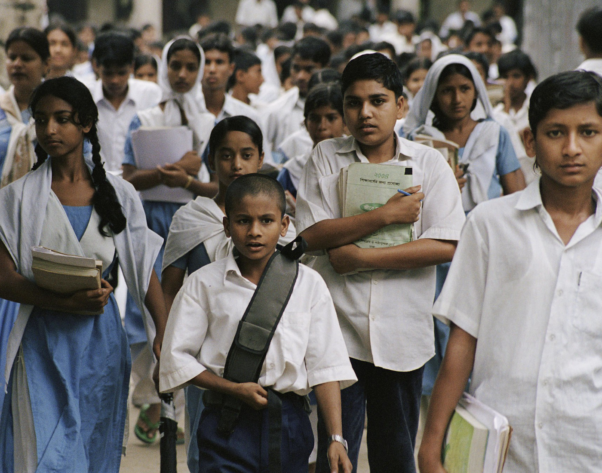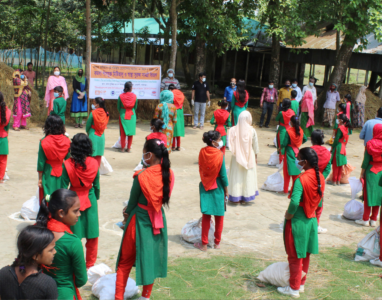
An International Potato Center project (CIP) in Bangladesh is making creative use of technology and distribution to ensure that nutritious orange-fleshed sweetpotato is reaching needy families during the COVID-19 pandemic.
As in many countries, the Bangladeshi government has imposed lockdowns to restrict the spread and incidence of the virus, leaving some families at risk for malnutrition due to food shortages as a result of lost daily wages.
Many Bangladeshi families already struggle to meet food and nutrition requirements for their families. While rice is commonly in surplus, access to more nutritious foods remains a challenge, which has been exacerbated by COVID-19.
In this food crisis, biofortified sweetpotato has become an important crop in helping households fight hunger and malnutrition using the starchy, vitamin A rich root. Through the Development and delivery of biofortified crops at scale project (DDBIO), a total of 135 tons of biofortified sweetpotato were grown by 614 poor and marginal farmers in northern districts of Bangladesh during the 2019-20 planting season.
While most farmers kept 50% of their produce (~65 tons) for household consumption, around 45 tons were sold to their neighbors and in local markets. So how to ensure the remaining surplus reached families who needed it most?
To achieve this objective, CIP partnered with Gana Unnayan Kendra (GUK), a local NGO, to distribute sweetpotato and health protection items among school students and poor families in the rural Gaibandha district in northern Bangladesh. Four hundred families received 10 kg of biofortified sweetpotato, one piece of soap, two masks and one packet of detergent powder. To identify families in need, CIP worked with schools as well as households with children under five years of age in the community. Each family also received brochures about COVID-19 and safe practices to avoid catching the virus.
Meanwhile, in urban markets, CIP worked with Parmeeda— a leading online seller of safe and fresh food—to sell sweetpotato through Facebook. Through this approach, CIP and Parmeeda engaged more than 4,000 people and responded to numerous comments and questions about the benefits of biofortified sweetpotato. The roots were sourced from Gaibandha, and altogether, Parmeeda sold 1.6 tons of biofortified sweetpotato, far below market demand as all the remaining available sweetpotato had been purchased.
“Biofortified sweetpotato has become one of the most sought-after goods as consumers have a special need for this nutrient rich food crop. Currently, demand outweighs supply. A year-round supply might help farmers and consumers who have mutual interests to benefit,” said Abu Dharba, the owner of Parmeeda.
 Some market research from Parmeeda shows encouraging prospects for growth in the future. Of families expressing an interest in biofortified sweetpotato, only 20% of the families with children were able to secure the produce, meaning not only that there is more demand for the crop, but that target groups can be reached if supply is increased. For online sales of biofortified sweetpotato, 63% of the buyers were female. As women tend to have greater awareness of nutritional household needs, this figure suggests that targeting women with marketing campaigns could also drive future sales.
Some market research from Parmeeda shows encouraging prospects for growth in the future. Of families expressing an interest in biofortified sweetpotato, only 20% of the families with children were able to secure the produce, meaning not only that there is more demand for the crop, but that target groups can be reached if supply is increased. For online sales of biofortified sweetpotato, 63% of the buyers were female. As women tend to have greater awareness of nutritional household needs, this figure suggests that targeting women with marketing campaigns could also drive future sales.
These were encouraging and positive steps for DDBIO, a three-year multi-country initiative from CIP and funded by the UK Foreign, Commonwealth and Development Office. The program works in five countries (including Bangladesh) and aims to increase production, marketing and consumption of biofortified sweetpotato to improve the diets of rural people and fight vitamin-A deficiency, especially women of child-bearing age, adolescent girls, and children under five.
Debashish Chanda, CIP Bangladesh Program Coordinator
